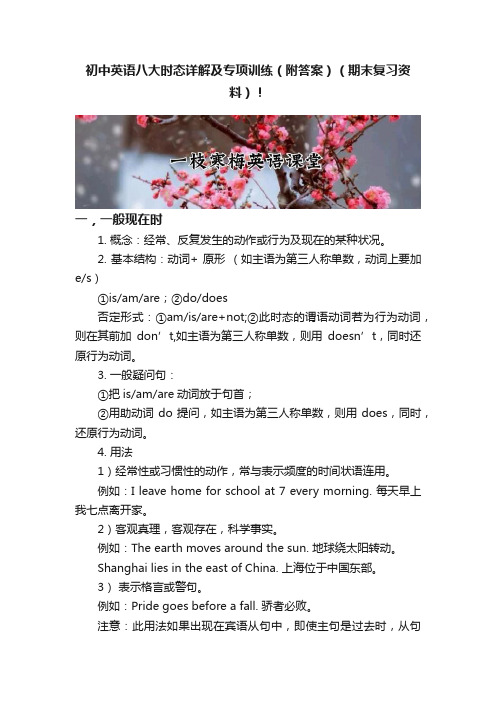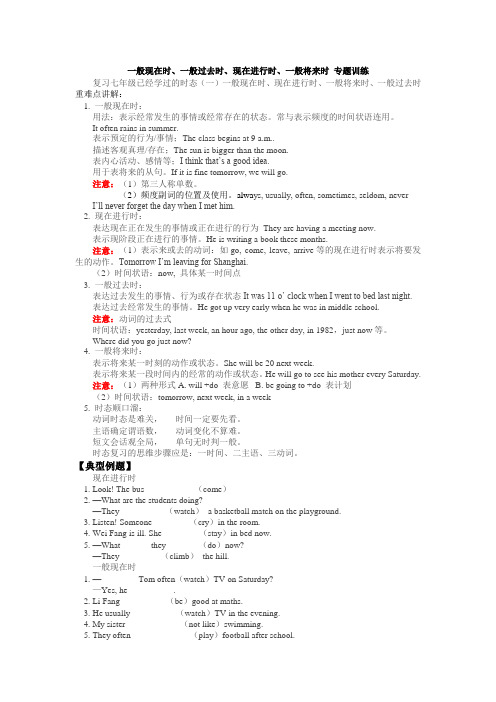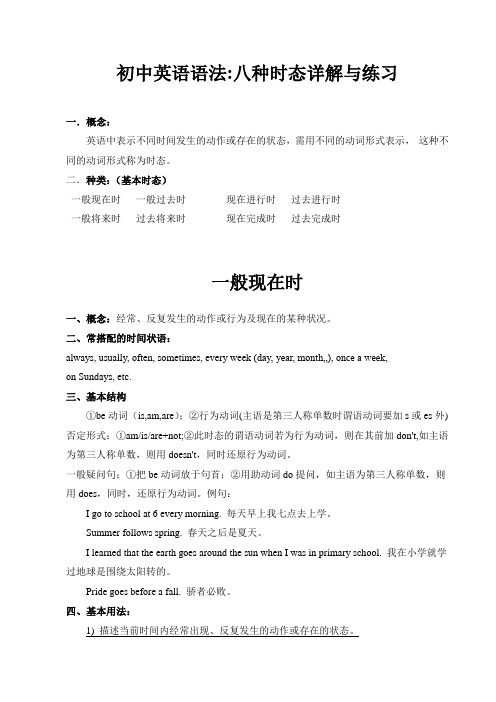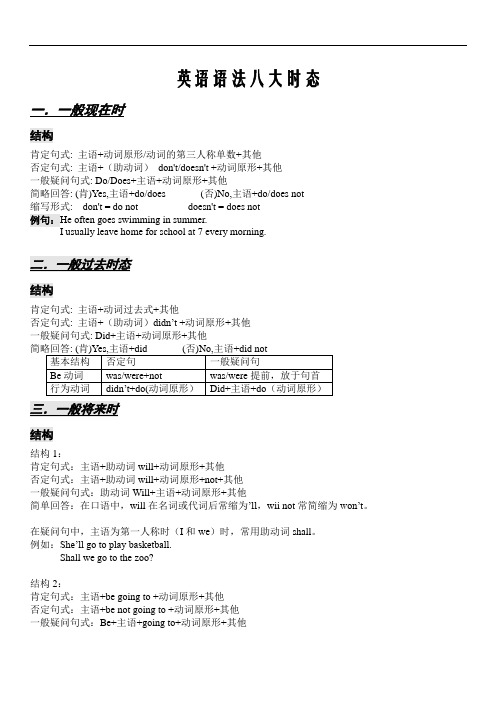初中英语语法一般现在时、将来时、过去时讲解及练习题
- 格式:doc
- 大小:376.00 KB
- 文档页数:29

初中英语四大时态练习题初中英语的四大时态包括一般现在时、一般过去时、一般将来时和现在进行时。
以下是针对这四种时态的练习题,帮助学生更好地掌握和运用这些时态。
一般现在时:1. 用一般现在时填空:- The sun ________ (rise) in the east every day.- I ________ (go) to school by bus every morning.2. 将下列句子改为否定形式:- She speaks English very well.- They play football every weekend.3. 将下列句子改为一般疑问句,并给出肯定和否定回答:- He likes to read books.- We have a meeting at 3 PM.一般过去时:4. 用一般过去时填空:- She ________ (visit) her grandparents last weekend.- They ________ (have) a party yesterday.5. 将下列句子改为否定形式:- He played basketball yesterday.- She watched a movie last night.6. 将下列句子改为一般疑问句,并给出肯定和否定回答:- They went to the beach last summer.- I saw a movie last Friday.一般将来时:7. 用一般将来时填空:- I ________ (take) a trip next month.- We ________ (have) a test on Friday.8. 将下列句子改为否定形式:- He will go to the concert tomorrow.- She will finish her homework tonight.9. 将下列句子改为一般疑问句,并给出肯定和否定回答:- They will visit the museum next week.- I will start a new job next month.现在进行时:10. 用现在进行时填空:- Look! The children ________ (play) in the park. - Listen! She ________ (sing) in the next room.11. 将下列句子改为否定形式:- He is reading a book now.- They are watching TV.12. 将下列句子改为一般疑问句,并给出肯定和否定回答: - She is cooking dinner.- We are going to the cinema tonight.答案:1. rises, go2. She doesn't speak English very well. They don't playfootball every weekend.3. Does he like to read books? Yes, he does. / No, he doesn't. Do we have a meeting at 3 PM? Yes, we do. / No, we don't.4. visited, had5. He didn't play basketball yesterday. She didn't watch a movie last night.6. Did they go to the beach last summer? Yes, they did. / No, they didn't. Did I see a movie last Friday? Yes, I did. / No,I didn't.7. will take, will have8. He won't go to the concert tomorrow. She won't finish her homework tonight.9. Will they visit the museum next week? Yes, they will. / No, they won't. Will I start a new job next month? Yes, I will. / No, I won't.10. are playing, is singing11. He isn't reading a book now. They aren't watching TV.12. Is she cooking dinner? Yes, she is. / No, she isn't. Are we going to the cinema tonight? Yes, we are. / No, we aren't.。

一般现在时的用法一、概述一般现在时表示习惯性、经常性、反复性的动作或存在的状态。
―习惯性、经常性、反复性‖是一般现在时的三大特性,它不表示特定时间内发生的事。
二、一般现在时的结构时态的结构指的是动词的变化形式。
一般现在时间有两种结构,一种是动词原形,用于主语为非第三人称时的情况;另一种为动词的第三人称单数形式,用于主语为第三人称时的情况。
Eg1.We often get up early in the morning.Eg2.My father often gets up early in the morning.三、谈谈“主语为三单,其后动词s添”在一般现在时中,当主语为第三人称单数时,谓语动词要用第三人称单数形式。
可以简单叙述为―主语为三单,其后动词s添‖。
何谓第三人称单数?用一句话概括就是―非你、非我、非复数‖,如he, she, it, my father, my mother, my sister, our English teacher, Tom, Mike, Liu Jia, China, my book, etc.Eg3.He sometimes goes to school by bike.Eg4.My father works in the hospital as a doctor.四、动词第三人称单数变化规则动词第三人称变化的规则与可数名词复数变化的规则相同。
规则一、一般在词尾加-s。
如:looks, puts. reads, sees, skis等。
规则二、以-o, -s, -x, -sh, -ch结尾的加-es。
如:goes, does, misses, passes, mixes, fixes, pushes, wishes, watches, teaches,等。
规则三、以辅音字母加y结尾的,变y为i,再加-es。
注意一定是辅音字母加y才变,若是元音字母加y,则直接加-s。

初中英语八大时态详解及专项训练(附答案)(期末复习资料)!一,一般现在时1. 概念:经常、反复发生的动作或行为及现在的某种状况。
2. 基本结构:动词+ 原形(如主语为第三人称单数,动词上要加e/s)①is/am/are;②do/does否定形式:①am/is/are+not;②此时态的谓语动词若为行为动词,则在其前加don’t,如主语为第三人称单数,则用doesn’t,同时还原行为动词。
3. 一般疑问句:①把is/am/are动词放于句首;②用助动词do提问,如主语为第三人称单数,则用does,同时,还原行为动词。
4. 用法1)经常性或习惯性的动作,常与表示频度的时间状语连用。
例如:I leave home for school at 7 every morning. 每天早上我七点离开家。
2)客观真理,客观存在,科学事实。
例如:The earth moves around the sun. 地球绕太阳转动。
Shanghai lies in the east of China. 上海位于中国东部。
3)表示格言或警句。
例如:Pride goes before a fall. 骄者必败。
注意:此用法如果出现在宾语从句中,即使主句是过去时,从句谓语也要用一般现在时。
例如:Columbus proved that the earth is round. 哥伦布证实了地球是圆的。
4)现在时刻的状态、能力、性格、个性。
例如:I don't want so much. 我不要那么多。
He writes good English but does not speak well.他英语写得不错,讲的可不行。
5)一般现在时表示将来含义。
a. 下列动词come, go, arrive, leave, start, begin, return的一般现在时可以表示将来,主要用来表示在时间上已确定或安排好的事情。
例如:The train leaves at six tomorrow morning. 火车明天上午六点开。

一般现在时、一般过去时、现在进行时、一般将来时专题训练复习七年级已经学过的时态(一)一般现在时、现在进行时、一般将来时、一般过去时重难点讲解:1. 一般现在时:用法:表示经常发生的事情或经常存在的状态。
常与表示频度的时间状语连用。
It often rains in summer.表示预定的行为/事情;The class begins at 9 a.m..描述客观真理/存在;The sun is bigger than the moon.表内心活动、感情等;I think that’s a good idea.用于表将来的从句。
If it is fine tomorrow, we will go.注意:(1)第三人称单数。
(2)频度副词的位置及使用。
alwa ys, usually, often, sometimes, seldom, never I’ll never forget the day when I met him.2. 现在进行时:表达现在正在发生的事情或正在进行的行为They are having a meeting now.表示现阶段正在进行的事情。
He is writing a book these months.注意:(1)表示来或去的动词:如go, come, leave, arrive等的现在进行时表示将要发生的动作。
Tomorrow I’m leaving for Shanghai.(2)时间状语:now, 具体某一时间点3. 一般过去时:表达过去发生的事情、行为或存在状态It was 11 o’ clock when I went to bed last night.表达过去经常发生的事情。
He got up very early when he was in middle school.注意:动词的过去式时间状语:yesterday, last week, an hour ago, the other day, in 1982,just now等。

初中英语语法:八种时态详解与练习一.概念:英语中表示不同时间发生的动作或存在的状态,需用不同的动词形式表示,这种不同的动词形式称为时态。
二.种类:(基本时态)一般现在时一般过去时现在进行时过去进行时一般将来时过去将来时现在完成时过去完成时一般现在时一、概念:经常、反复发生的动作或行为及现在的某种状况。
二、常搭配的时间状语:always, usually, often, sometimes, every week (day, year, month…), once a week,on Sundays, etc.三、基本结构①be动词(is,am,are);②行为动词(主语是第三人称单数时谓语动词要加s或es外) 否定形式:①am/is/are+not;②此时态的谓语动词若为行为动词,则在其前加don't,如主语为第三人称单数,则用doesn't,同时还原行为动词。
一般疑问句:①把be动词放于句首;②用助动词do提问,如主语为第三人称单数,则用does,同时,还原行为动词。
例句:I go to school at 6 every morning. 每天早上我七点去上学。
Summer follows spring. 春天之后是夏天。
I learned that the earth goes around the sun when I was in primary school. 我在小学就学过地球是围绕太阳转的。
Pride goes before a fall. 骄者必败。
四、基本用法:1) 描述当前时间内经常出现、反复发生的动作或存在的状态。
在这种情景中,句子常带有表示频率的时间状语:always , everyday , often , once a week (month , year , etc.) , sometimes , seldom , usually等等,以表示句中的动作或状态是习惯性的、经常性的。

英语语法八大时态一.一般现在时结构肯定句式: 主语+动词原形/动词的第三人称单数+其他否定句式: 主语+(助动词)don't/doesn't +动词原形+其他一般疑问句式: Do/Does+主语+动词原形+其他简略回答: (肯)Yes,主语+do/does (否)No,主语+do/does not缩写形式: don't = do not doesn't = does not例句:He often goes swimming in summer.I usually leave home for school at 7 every morning.二.一般过去时态结构肯定句式: 主语+动词过去式+其他否定句式: 主语+(助动词)didn’t +动词原形+其他一般疑问句式: Did+主语+动词原形+其他基本结构否定句一般疑问句Be动词was/were+not was/were提前,放于句首行为动词didn’t+do(动词原形)Did+主语+do(动词原形)三.一般将来时结构结构1:肯定句式:主语+助动词will+动词原形+其他否定句式:主语+助动词will+动词原形+not+其他一般疑问句式:助动词Will+主语+动词原形+其他简单回答:在口语中,will在名词或代词后常缩为’ll,wii not常简缩为won’t。
在疑问句中,主语为第一人称时(I和we)时,常用助动词shall。
例如:She’ll go to play basketball.Shall we go to the zoo?结构2:肯定句式:主语+be going to +动词原形+其他否定句式:主语+be not going to +动词原形+其他一般疑问句式:Be+主语+going to+动词原形+其他简略回答:(肯)Yes,主语+be (否)No,主语+be not将来时其他表示法1)be going to表示将来表示说话人的打算、计划、安排或根据迹象判断必然或很可能发生的事情。
初一英语四个时态练习题初一英语学生在学习英语时,掌握基本的时态是非常重要的。
以下是一些练习题,帮助学生巩固四个基本时态:一般现在时、一般过去时、一般将来时和现在进行时。
# 一般现在时(Simple Present Tense)1. 用括号中所给动词的正确形式填空。
- I (be) a student.- She (go) to school every day.- They (like) playing basketball.2. 改写下列句子,使其变为否定句。
- He plays the guitar. → He doesn't play the guitar.3. 将下列句子变为一般疑问句,并给出肯定和否定回答。
- She watches TV in the evening.- Does she watch TV in the evening? Yes, she does. No, she doesn't.# 一般过去时(Simple Past Tense)1. 用括号中所给动词的过去式填空。
- I (visit) my grandparents last weekend.- They (have) a party yesterday.- She (do) her homework last night.2. 改写下列句子,使其变为否定句。
- We went to the park yesterday. → We didn't go to the park yesterday.3. 将下列句子变为一般疑问句,并给出肯定和否定回答。
- He read a book last night.- Did he read a book last night? Yes, he did. No, hedidn't.# 一般将来时(Simple Future Tense)1. 用括号中所给动词的正确形式填空。
九年级英语时态复习练习题及答案一、一般现在时1、 We often _______ (play) in the playground答案:play解析:often 是一般现在时的标志词,主语 we 是复数,动词用原形。
2、 He _______ (get) up at six o'clock every day答案:gets解析:every day 是一般现在时的标志词,主语he 是第三人称单数,动词 get 要加 s 变成 gets。
3、 The earth _______ (move) around the sun答案:moves解析:客观真理用一般现在时,主语 the earth 是第三人称单数,动词 move 要加 s 变成 moves。
二、一般过去时1、 I _______ (go) to the zoo yesterday答案:went解析:yesterday 是一般过去时的标志词,go 的过去式是 went。
2、 She _______ (be) happy last week答案:was解析:last week 是一般过去时的标志词,主语 she 是第三人称单数,be 动词用 was。
3、 They _______ (not do) their homework last night答案:didn't do解析:last night 是一般过去时的标志词,否定句要用助动词didn't,后面接动词原形 do。
三、一般将来时1、 We _______ (have) a party next week答案:will have / are going to have解析:next week 是一般将来时的标志词,可以用 will +动词原形或者 be going to +动词原形的结构。
2、 He _______ (come) back tomorrow答案:will come / is going to come解析:tomorrow 是一般将来时的标志词,同理可用 will +动词原形或者 be going to +动词原形。
一般现在时、一般过去时、一般将来时——练习题答案解析一星题1.go解析:早上七点上班是一件经常做的事,所以是一般现在时。
We是复数,所以用go。
2.read解析:last night是昨晚,是一般过去时的标志词,read的过去式还是read。
3.Swept,didn’t解析:yesterday是一般过去时的标志词,所以用sweep的过去式,是swept,but表示转折,意味着我拖地板了但是妈妈没有,所以第二空填表示否定的,只有一个空,所以用助动词,didn’t。
4.Did,do,did解析:just now解释为刚才,是一般过去时标志词,所以是did,do,did。
5.Didn’t do解析:一般过去时否定句结构是didn’t do,原句中的动词过去式在加上didn’t之后变成原型,did就变为do。
6.Did,find,any解析:一般过去时一般疑问句的句子结构是Did+主语+do…?所以found变为find,some 变为any。
7.D解析:free是形容词,所以是be free,tomorrow是将来时标志词,所以前半句是Are you going to be free tomorrow?后半句把be going to换成了will。
所以是will be。
8.C解析:next week是将来时的标志词,there be句型表示“什么时候/什么地方有什么”,这里的有不需要再用have,所以是is going to be或者will be。
选择C。
两星题1.C解析:这里的Shall I表建议,如果是拒绝的回答就用No,please don’t。
2.C解析:in three days,在三天内,表将来,所以是C。
3.A解析:学好英语需要一段很长的时间,这是一个客观事实,所以用一般现在时。
所以选A。
4.Did,water;watered解析:this morning是已经过去了的今天早晨,所以是过去时,所以用Did,water,water 过去式直接加ed。
初中英语时态讲解及练习(含答案)时态1. 一般现在时●形式:do does(单数第三人称)●意义:一般现在时表示客观的、普遍性的真理以及经常性的事件。
●用法:A) 表示现在发生的动作、情况、状态和特征。
B) 经常性、习惯性动作。
e.g.:He always helps others. (他总是帮助别人。
)He often goes to the gym.C) 客观事实和普遍真理。
尤其要注意,如果前后文不是一般现在时,则无法保持主句、从句时态一致。
e.g.: The sun rises in the east and sets in the west.Knowledge is power.●这一用法场合一些表动作频率的时间副词连用:1). 表示肯定的频率副词:always, frequently, usually, sometimes, generally, occasionally, often etc.2). 表示否定的频率副词:never, seldom, rarely etc.这些副词的位置:在Be动词后,实义动词前。
e.g. He is always late.2. 一般过去时●形式:did●意义:一般过去时表示在过去的某一特定时间发生和结束的活动或情况。
●用法:A) 表示过去某个时间发生的动作或情况。
e.g.: I saw him in the library yesterday morning. (有特定的时间状语)yesterday, yesterday evening, last night/month/spring/year, the night before last(前天晚上),three days/months/years ago, in 1999 etc.。
这些时间状语之前不用加介词。
B) 表示过去习惯性动作,一直持续或反复发生的动作,此时可与表示拼读的时间副词连用。
e.g.: I slept for eight hours last night. (表示在过去某一段时间内持续的动作,但这动作现在已经结束了)3. 一般将来时●形式:will/shall do或be going to do●意义:一般将来时表示在未来的某个时间将要发生的某个动作或状态。
一般现在时知识精讲一、一般现在时表示通常性、规律性、习惯性、真理性的状态或者动作有时间规律发生的事件的一种时间状态。
二、句子结构主语(第一/二人称/第三人称复数)+do (动词原形)主语(第三人称单数)+does (动词三单形式)主语+am/ is /are三、基本用法四、时间状语1. 表示频率的副词: always, usually, often, sometimes, never, hardly, seldom…2. every/once+名词: every day/ week/ year, once a week/ month …3. 表示时间的短语: twice a day, on weekends, on Mondays…五、一般现在时动词三单的变化规律六、相关句式三点剖析一、考点:时态是英语学习中的核心内容之一,是英语学习的基础。
自然,时态考查是各种英语考试尤其是中考时的座上宾。
动作发生的时间决定时态,时态决定动词的形式,而考卷中的时态题通常没有给出明确的时间标志词,考试需领悟所提供的语境来做出判断。
只有推断出动作发出的正确时间,才可能正确答题,这就要求考生在熟练掌握时态结构、用法并牢记常用的时间状语的基础上,要充分利用上下文中隐含的信息来捕捉时间,找准答题的突破口。
二、重难点:一般现在时在考试中的重难点是:句子结构、基本用法、标志时间状语、动词三单的变化规则及相关句式的变化。
三、补充点:1. 表示按计划或安排好的,或将要发生的动作,可用一般现在时表将来。
但只限于start, begin, leave, go, come, arrive, return, take place等。
例:My train leaves at 7:00 this afternoon.我乘坐的火车将在今天下午7点离开。
2. 在复合句中,当主句是一般将来时,时间或条件状语从句的谓语动词只能用一般现在时来表示将来要发生的动作。
例:If it rains tomorrow, we won’t go there.假如明天下雨,我就不会去那了。
3.以here, there 开头的倒装句中,一般现在时表示现在正在发生的动作或存在的状态。
例:There goes the bell. 铃响了。
Here runs the boy. 小男孩跑过来了。
题模精讲题模一动词的三单变化规则例1.1、They often _________ (play) football in the playground after school.例1.2、Mike sometimes _________ (go) to the library with his sister.例1.3、Some students are very active and _________ (do) exercise and every day.例1.4、Nick _________ (not clean) his room on weekdays.例1.5、The sun ________ (rise) in the east.题模二基本用法例2.1、My grandpa _________ a walk after supper every day.A、will takeB、takesC、tookD、has taken例2.2、Wang Mei _________ music and often _________ to music.A、likes; listensB、like; listenC、like; are listeningD、liking; listen例2.3、Every year, thousands of farmers______ to big cities to find jobs.A、g oB、w entC、h ave goneD、w ill go题模三句型转换例3.1、Tom often helps his parents do housework at home.(改为否定句)____________________________________________例3.2、Amy likes reading English novels.(改为一般疑问句,作否定回答)_____________________________________________随堂练习随练1.1、Jim _________ (be) very clever, and all of his friends like him.随练1.2、School_________ (start) at eight o’clock.随练1.3、Mrs. Read _________ (clean) the windows once a week.随练1.4、_________ you usually _________ (get) up at six in the morning?随练1.5、Who _________ (speak) English best in your class?随练1.6、The boy _________ (wash) his clothes twice a month.随练1.7、It usually_________ (take) me about one hour to finish my homework.随练1.8、The earth _________ (move) around the sun.随练1.9、Mr. Green _________(has) a radio(否定形式).随练1.10、My father always _________ back from very late.A、comeB、cameC、is comingD、comes随练1.11、My grandpa _________ youngA、looksB、is lookedC、lookD、is looking随练1.12、Alice _________ to the library with her friends on Sundays.A、wantB、wantedC、wantsD、is wanting随练1.13、They _________ long hair and big eyes.A、doB、doesC、hasD、have随练1.14、If Bob _________ away from the junk food, he will be in good health.A、stayB、will stayC、staysD、doesn’t stay一般过去时知识精讲一、一般过去时表示过去某个时间里发生的动作或状态;过去习惯性、经常性的动作、行为;过去主语所具备的能力和性格。
二、句子结构主语+did (动词过去式)主语+was/were三、基本用法四、时间状语:1. yesterday, the day before yesterday2.时间段+ago: three years ago, long ago…3. last: last day/ week/ year…4. in+过去年份: in 2015…5. just now 刚才五、一般过去时动词过去式的规则变化六、一般过去时动词过去式的不规则变化七、相关句式三点剖析一、考点:一般过去时的基本用法以及动词过去式的规则变化和不规则变化。
二、易错点:be(is, am, are) 动词本身就是独立的谓语动词,不能与行为动词的过去式同时使用。
不少学生经常出这样的错误。
例:It was rained yesterday. (错误)It rained yesterday. (正确)过去式动词不存在第三人称单数的问题。
也就是说,一般过去时的句子中,无论主语是什么人称,单数还是复数,统一为动词的过去式。
三、补充点在时间状语从句和条件状语从句中,用一般过去时表示过去将来的动作。
例:He said he would come if I promised to wait for him.他说如果我答应等他,他会来的。
题模精讲题模一动词的过去式变化规则例1.1、写出下列动词的过去式形式。
1.am/is _________ do _________ go _________ have_________2. isn’t _________ aren’t _________ spend_________ cook_________3. read _________ clean _________ live _________ study_________题模二基本用法例2.1、My father _________ ill yesterday.A、isn’tB、aren’tC、wasn’tD、weren’t例2.2、--- ______ he ______ his lunch last night?--- Yes, he did.A、Does; hasB、Did; haveC、Did; hasD、Does; had例2.3、Did you_________ to the national library last week?A、goB、wentC、g oesD、g oed题模三句型转换例3.1、Lucy did her homework at home.(改为否定句)_________________________________例3.2、I read an interesting book about history last night. (改为否定句)____________________________________例3.3、He found some meat in the fridge.(变一般疑问句)____________________________________例3.4、There was some orange juice in the cup.(变一般疑问句,并作肯定回答)____________________________________例3.5、She saw Li Lei just now. (变一般疑问句,并作否定回答)____________________________________________随堂练习随练2.1、read ______ is ______随练2.2、He ______ (study) in the university four years ago.随练2.3、My best friend ______ (take) a small present to me just now.随练2.4、At the end of the day, the science teacher ______ (is) very happy because the class monitor cleaned the bus after the trip.随练2.5、Paul and I ______ (play) tennis yesterday. He did much better than I.随练2.6、His sister ______ (tell) a story to his daughter last Sunday.随练2.7、She saw Li Lei just now. (变一般疑问句,并作否定回答)____________________________________随练2.8、take ______ play ______随练2.9、arrive ______ do ______随练2.10、study ______ see ______随练2.11、teach ______ change ______随练2.12、sleep ______ come ______一般将来时知识精讲一、一般将来时表示将来某一时刻的动作或状态,或将来某一段时间内经常发生的动作或存在的状态。